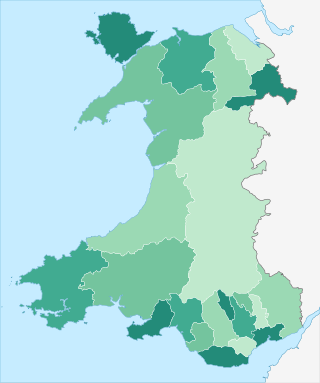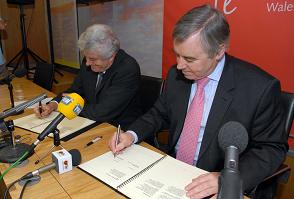
Since 1 April 1996, Wales has been divided into 22 single-tier principal areas, styled as counties or county boroughs for local government purposes. The elected councils of these areas are responsible for the provision of all local government services, including education, social work, environmental protection, and most highways. Below these there are also elected community councils to which responsibility for specific aspects of the application of local policy may be devolved. The last set of local elections in Wales took place in 2022, with the next due to take place in 2027.

The Diana, Princess of Wales Memorial Fund was an independent grant-giving foundation established in September 1997 after the death of Diana, Princess of Wales, to continue her humanitarian work in the United Kingdom and overseas. It was a registered charity under English law. The Fund closed at the end of 2012.

The 2004 election to the post of Mayor of London took place on 10 June 2004. It was being held on the same day as other local elections and the UK part of the 2004 European Parliament elections, so Londoners had a total of five votes on three ballot papers. Polling opened at 07:00 local time, and closed at 22:00. See: 2004 UK elections. The Supplementary Vote system was used.

Islamic Relief Worldwide is a faith-inspired humanitarian and development agency which is working to support and empower the world's most vulnerable people.
Danish Committee for Aid to Afghan Refugees (DACAAR)(Danish: Den danske komité for hjælp til afghanske flygtninge) is a non-political, non-governmental, non-profit humanitarian and development organization working to improve the lives of the Afghan people since 1984.

Meals on Wheels is a program that delivers meals to individuals at home who are unable to purchase or prepare their own meals. The name is often used generically to refer to home-delivered meals programs, not all of which are actually named "Meals on Wheels". Many of the housebound recipients are the elderly, and many of the volunteers are also elderly but able-bodied and able to drive automobiles.
Sure Start is a UK Government area-based initiative, announced in 1998 by the then Chancellor of the Exchequer, Gordon Brown, applying primarily in England with slightly different versions in Wales, Scotland and Northern Ireland. The initiative originated from HM Treasury, with the aim of "giving children the best possible start in life" through improvement of childcare, early education, health and family support, with an emphasis on outreach and community development.
Private sector development (PSD) is a term in the international development industry to refer to a range of strategies for promoting economic growth and reducing poverty in developing countries by building private enterprises. This could be through working with firms directly, with membership organisations to represent them, or through a range of areas of policy and regulation to promote functioning, competitive markets.

The Convention of Scottish Local Authorities (COSLA) is the national association of Scottish councils and acts as an employers' association for its 32 member authorities.
Supporting People is a UK government programme helping vulnerable people in England and Wales live independently and help them to remain in their home. Initially, it was to help tenants maintain their social housing tenancies, but it has since been broadened to provide housing related support for anyone regardless of housing status. This includes private and social tenants, home owners, homeless people and those in temporary accommodation as well as people in sheltered accommodation or other specialist housing. It is run by local government and provided by the voluntary sector. It was launched on 1 April 2003.
Nacro is a social justice charity based in England and Wales, established in 1966 from the previous National Association of Discharged Prisoners’ Aid Societies, it became the largest criminal justice-related charity in England and Wales. In the 1970s Nacro also became involved in policy discussions with the British Government, particularly with the Home Office, which has responsibility for prisons and probation services. Since 2011, its strategy has focused on extending its high-level influence at government level, with commissioners, policy makers and practitioners, and increasing its partnership work.
A law centre is a specific type of not-for-profit legal practice in the United Kingdom which provides legal aid to people otherwise not able to access commercial legal support. Law centres are independent and directly accountable to the communities they serve, usually through committees of local community members. The Law Centres Network (LCN) represents law centres in all levels of government.
Skills for Life was the national strategy in England for improving adult literacy, language (ESOL) and numeracy skills and was established as part of the wider national Skills Strategy to increase the numbers of young people and adults with adequate skills. The strategy was launched by the Prime Minister, Tony Blair, in March 2001.

Caia Park is a suburb and community in Wrexham, Wrexham County Borough, Wales. Created in 1985 after a boundary commission review of the four community areas within Wrexham, of which, Caia Park occupies its east, with the others being Acton, Offa, and Rhosddu. At the 2001 census, the community had a population of 11,882 in 5,019 households, increasing to 12,602 in 2011.

One Wales was the coalition agreement for the National Assembly for Wales between Labour and Plaid Cymru agreed to by Rhodri Morgan, First Minister of Wales and leader of Welsh Labour, and Ieuan Wyn Jones, leader of Plaid Cymru, on 27 June 2007. It was negotiated in the wake of the preceding National Assembly election which resulted in a large Labour plurality, but no majority. Labour and Plaid Cymru approved the document in separate votes on 6 and 7 July, respectively.
The Coalfields Regeneration Trust is a registered charity that works across the former Coalfield communities of England, Wales and Scotland. The Charity was founded in 1999. The Coalfields Regeneration Trust receives funding from the Department of Communities and Local Government for their work in English communities, The Welsh Government for their Welsh activities and the Scottish Government to cover their Scottish work. The Trust runs a number of initiatives and activities that make things happen at a community level in Coalfield areas. Each Country sets its own strategic objectives in line with local priorities.

Sir Michael Bayldon Barber is a British former public servant and educationist, best known for serving as Head of the Prime Minister's Delivery Unit under Tony Blair’s government. He was knighted in 2005 for his contributions to improving government. He is the founder and chairman of Delivery Associates, a global advisory firm focussed on working with governments and other public and social impact organisations to help deliver improved outcomes for people around the world.
The British Asian Trust was founded in 2007 by King Charles III and a group of pre-eminent British Asian business leaders. The Trust works to tackle the widespread poverty and hardship in South Asia to which millions are currently subjected.
Pembrokeshire Action To Combat Hardship (PATCH), formerly Milford Action To Combat Hardship (MATCH), is a British non-profit Christian faith based charitable organisation, founded in June 2008, that aims to help people who are in a financial crisis. They are based in Milford Haven, Pembrokeshire and have other 'bases' in Pembroke Dock, Saundersfoot and Haverfordwest.

The National Health Mission (NHM) was launched by the government of India in 2005 subsuming the National Rural Health Mission and National Urban Health Mission. It was further extended in March 2018, to continue until March 2020. It is headed by Mission Director and monitored by National Level Monitors appointed by the Government of India.Rural Health Mission (NRHM) and the recently launched National Urban Health Mission (NUHM). Main program components include Health System Strengthening (RMNCH+A) in rural and urban areas- Reproductive-Maternal- Neonatal-Child and Adolescent Health, and Communicable and Non-Communicable Diseases. NHM envisages achievement of universal access to equitable, affordable and quality health care services that are accountable and responsive to the needs of the people.









